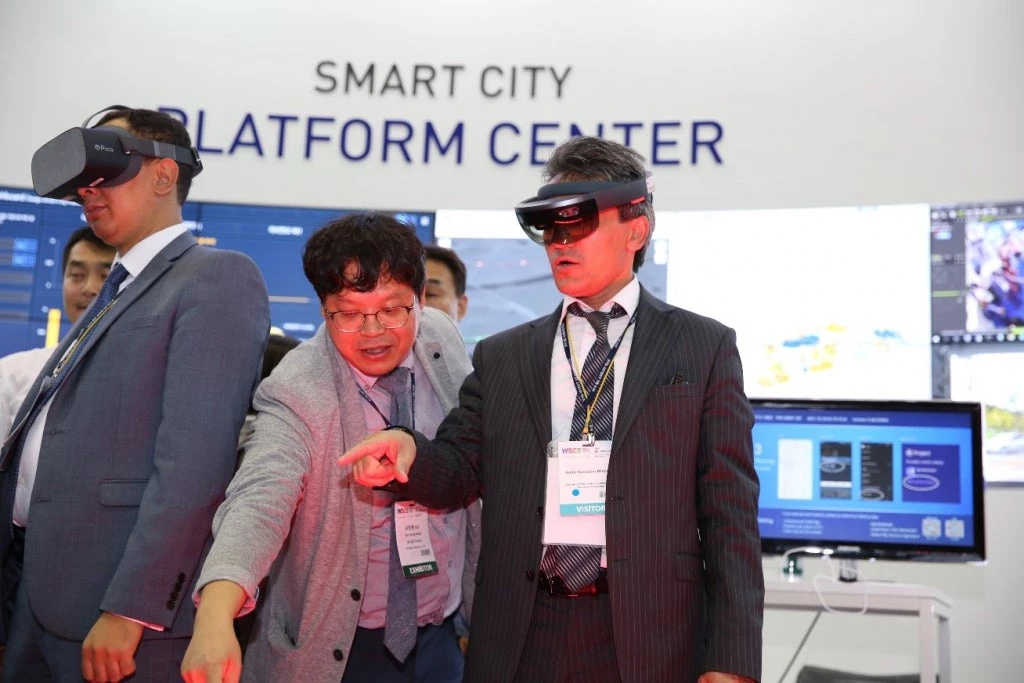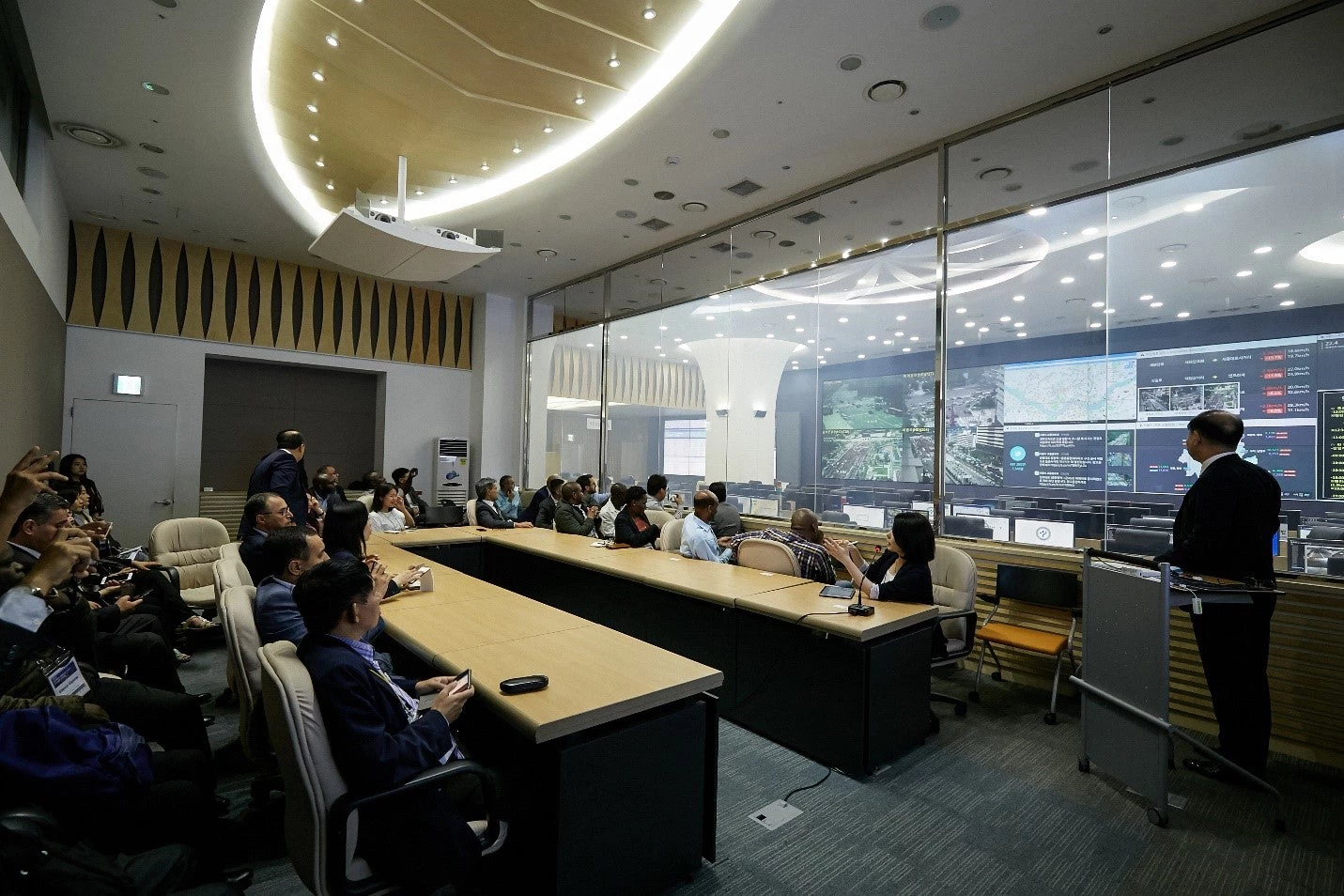 Back to a Future Seoul: Restored Cheonggyecheon Stream runs across the city. (Photo: Seoul Metropolitan Government)
Back to a Future Seoul: Restored Cheonggyecheon Stream runs across the city. (Photo: Seoul Metropolitan Government)
Editor’s note: From February 18-20, the World Bank will host Korea Innovation Week with representatives from 35 partner institutions and 7 Korean government ministries. “Smart cities” is one of the featured topics that will emphasize how Korea is leading the way in innovation and smart development.
As the world urbanizes rapidly, cities continue to be the physical and social base for people’s prosperity and nature’s sustainability. In recent years, the idea of “smart cities” has grown more prominent as new solutions emerge to address urbanization challenges. What is a smart city? What’s the role of smart cities in this urbanizing world?
There is not a single definition for smart cities. An action-oriented smart city focuses on making a practical and positive impact – with new, available technology – for its citizens, businesses, and the environment in line with urban and regional planning policies. A World Bank working paper on smart cities, for example, states that a smart city “plans and manages its core functions by effectively using data and digital technologies to become efficient, innovative, inclusive and resilient.”
Today’s remarkable advance in the information and communication technology (ICT) has a great potential to upgrade our cities and city making process, even to an unprecedented level. Meanwhile, “digital technologies are key enablers, but urban planning and management remain in the driver seat,” according to the paper.
While the conceptual definition of smart city is still under debate, many countries take actions to make their cities “smart.” The Republic of Korea is one of the leading countries. The country is an early adopter of the smart city concept not only at the city level, but also the national level.
Recently, the World Bank hosted its 3rd Korea Smart City Study Tour, bringing together 40 government officials and professionals specialized in urban planning and city management. Coming from 12 countries, the participants had a chance to learn from the Korean smart city experience – in smart mobility, smart waste and energy, smart citizenry, and smart public space.
Smart mobility
Most of the world’s large cities suffer from traffic jams. As a city grows, the traffic problem could get worse. This harms quality of life, economic prosperity, and environmental sustainability. Seoul proactively addressed this latent issue 17 years ago and transformed its transportation into smart mobility.
From 1970 to 2000, the share of people using buses to get around the city decreased from over 70% to less than 30%. Car users grew significantly in the meantime. However, after the city introduced the Seoul Smart Mobility Reform in 2003, the share of bus and subway riders bounced back to almost 70% and that of car users remained less than 30%. Seoul successfully reversed the vicious circle into a virtuous circle with advanced ICT including advanced intelligent transport system (ITS) technology, Bus Management System (BMS), and Global Positioning System (GPS).
For example, BMS is an integrated control center that can monitor the whole system in real time. The control center gathers information on vehicle positioning (location and speed), which in turn is communicated to the information service panel at the bus stops and via various applications to passengers via mobile phone and the Internet. The number of buses assigned to any given route can be adjusted. Any disruptions in the network can be better managed as the control center has direct communication with the individual bus drivers, which again can be communicated quickly to passengers, keeping passenger satisfaction high.
Smart waste and energy: circular economy
Another issue with urban growth is waste management and sustainable energy. Seoul, like many other cities, once suffered a spate of waste overloads and power shortages due to rapid growth. One of the solutions the city came up with is the Gangnam Resource Recovery Facility (RRF). The facility transforms waste into energy, which helps reduce landfill and power neighborhood heating. This approach leads to a reduction in fossil fuel use and carbon emissions, contributing to climate mitigation and sustainable urban growth.
Smart citizenry and e-Governance: enabling citizens to engage with their city
Open data makes people better informed and enables them to generate smarter solutions to their problems. Seoul’s smart city planning puts much effort in opening government data and building consensus through public participation. Seoul has increased public access to government services and data. For example, Seoul launched 120 Dasan Call Center in 2007. It is the telephone complaints handling system of the Seoul Metropolitan Government that directs all inquiries and complaints towards a single integrated call center, designed to process the daily grievances of the citizens more quickly and conveniently on a one-to-one consultation. Though the basic system is based on the 24/7 telephone counseling system, the 120 Dasan Call Center also provides consultations through other means such as SMS, social media, text chat, and video chat. The city was able to reduce long wait time and increase citizens’ satisfaction with upgraded service quality. The average number of calls was 22,000 per day in 2016.
Better communication between citizens and government and among citizens themselves helps balance the conflicting demands of social equity, economic growth, and environmental protection. Open Seoul will forge strong governance by enabling its citizens to better engage with their city and develop innovative solutions to their problems.

Smart public space: addressing an old issue in a new way enabled by technology
Smart cities like Seoul also reorganize public spaces as important assets to improve the quality of life and sustainability. Cheonggyecheon Stream Restoration is a good example. Cheonggyecheon adopted ICT and sensors to control the water level in times of torrential rain. Water quality sensors are used to detect the inflow of contaminants in advance to maintain water quality. The data is transmitted in real time to a control center, and open to citizens, too.
The restoration efforts benefited from smart technologies in flood prevention and water quality control. The Cheonggyecheon restoration has stopped annually recurring floods in the historic downtown area and helped reduce urban heat in the summer. Powered by technology, smart public space improved Seoul citizens’ quality of life, enhanced the vitality of the city’s neighborhoods, and strengthened its environmental sustainability.

The 3rd Korea Smart City Study Tour was organized by Korea’s Ministry of Land, Infrastructure and Transport (MOLIT), World Bank’s Smart Cities Knowledge Silo Breaker, and Korea-World Bank Partnership Facility, with the support of various organizations including the Korean Ministry of Science and ICT, and Korea Land and Housing Corporation (LH). The participants also had a chance to visit 2019 World Smart City Expo (WSCE) in Korea.
READ MORE
- Blog post: Korea Innovation Week - Learn how Korean institutions harness the power of technology for development
- Subscribe to our Sustainable Cities and Communities newsletter
- Follow @WBG_Cities on Twitter





Join the Conversation